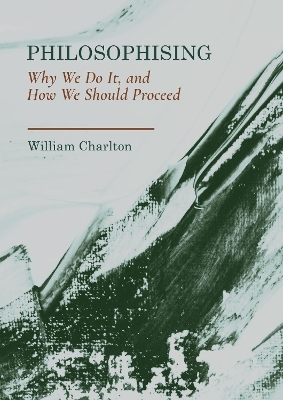
Philosophising
Why We Do It, and How We Should Proceed
Seiten
2023
|
New edition
Ethics International Press Ltd (Verlag)
978-1-80441-224-4 (ISBN)
Ethics International Press Ltd (Verlag)
978-1-80441-224-4 (ISBN)
- Titel nicht im Sortiment
- Artikel merken
Philosophers keep coming back to the same subjects; time, space, change, causation, consciousness, language, truth and goodness. This book offers a challenging new explanation as to why this might be.
The word 'philosophy' comes from the Greek word philosophia which was used in antiquity for love of knowledge that is more detailed and accurate or more abstruse than is needed for ordinary practical purposes. Ancient Greeks, who loved this sort of knowledge set up institutions for pursuing it. In the course of time much of the knowledge they pursued turned out to be of practical use after all. The sciences which now underpin civilised life began with enquiries that had no practical urgency into natural phenomena and human institutions, enquiries that were of interest only to the leisured and curious. Much that was then philosophia is not philosophy today, but physics, biology, mathematics, history, economics. What is now philosophy is a sort of residue of those enquiries, something like the lees of wine left in the bottle after the drinkable liquid has been decanted.
That being so, it might seem strange that philosophy is still pursued, that universities teach it, and publishers sell works of it. A simple reason is that this residue, seemingly useless for practical purposes, has actually had enormous practical significance. All universities in the world today are modelled on the institutions, known as the Academy and the Lyceum, founded in Athens by the philosophers Plato and Aristotle in the fourth century BC. It is to philosophy as they understood it that we owe the concept of an academic discipline.
Furthermore, philosophical reflection has influenced the course of history. To look back only a little way from the present, it inspired National Socialism, International Communism, wars of independence in America, and the French Revolution.
Philosophers keep coming back to the same subjects; time, space, change, causation, consciousness, language, truth and goodness. This book offers a challenging new explanation as to why this might be: whatever we think about, we think about in two different ways, and we either confuse these different ways of thinking, or we imagine we are thinking of two different things. It advises philosophers to stop looking for new facts, and to think of their subject less as a field for research than as a form of literature that brings puzzling over its topics to life.
The word 'philosophy' comes from the Greek word philosophia which was used in antiquity for love of knowledge that is more detailed and accurate or more abstruse than is needed for ordinary practical purposes. Ancient Greeks, who loved this sort of knowledge set up institutions for pursuing it. In the course of time much of the knowledge they pursued turned out to be of practical use after all. The sciences which now underpin civilised life began with enquiries that had no practical urgency into natural phenomena and human institutions, enquiries that were of interest only to the leisured and curious. Much that was then philosophia is not philosophy today, but physics, biology, mathematics, history, economics. What is now philosophy is a sort of residue of those enquiries, something like the lees of wine left in the bottle after the drinkable liquid has been decanted.
That being so, it might seem strange that philosophy is still pursued, that universities teach it, and publishers sell works of it. A simple reason is that this residue, seemingly useless for practical purposes, has actually had enormous practical significance. All universities in the world today are modelled on the institutions, known as the Academy and the Lyceum, founded in Athens by the philosophers Plato and Aristotle in the fourth century BC. It is to philosophy as they understood it that we owe the concept of an academic discipline.
Furthermore, philosophical reflection has influenced the course of history. To look back only a little way from the present, it inspired National Socialism, International Communism, wars of independence in America, and the French Revolution.
Philosophers keep coming back to the same subjects; time, space, change, causation, consciousness, language, truth and goodness. This book offers a challenging new explanation as to why this might be: whatever we think about, we think about in two different ways, and we either confuse these different ways of thinking, or we imagine we are thinking of two different things. It advises philosophers to stop looking for new facts, and to think of their subject less as a field for research than as a form of literature that brings puzzling over its topics to life.
William Charlton was Head of the Philosophy Department at Edinburgh University, UK. He taught philosophy as a graduate student at Oxford, as a Lecturer in Mental and Moral Science at Trinity College, Dublin, as a Senior Lecturer at Newcastle University, and as a visiting Professor at the universities of Bucharest and Cluj, Romania. He is the author of fifteen books on philosophy, and eighty articles in philosophical journals.
| Erscheinungsdatum | 11.07.2023 |
|---|---|
| Verlagsort | Bury St Edmunds |
| Sprache | englisch |
| Maße | 156 x 234 mm |
| Themenwelt | Geisteswissenschaften ► Philosophie |
| ISBN-10 | 1-80441-224-4 / 1804412244 |
| ISBN-13 | 978-1-80441-224-4 / 9781804412244 |
| Zustand | Neuware |
| Haben Sie eine Frage zum Produkt? |
Mehr entdecken
aus dem Bereich
aus dem Bereich
wie Philosophie uns helfen kann, unseren Weg zu finden
Buch | Hardcover (2023)
dtv Verlagsgesellschaft
CHF 39,90


